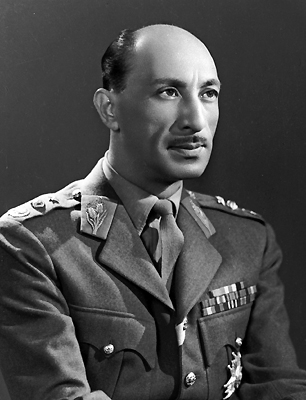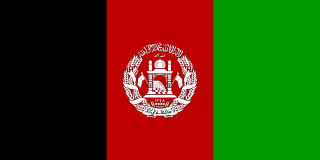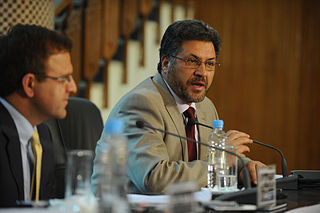Related Research Articles

Mohammed Zahir Shah was the last king of Afghanistan, reigning from 8 November 1933 until he was deposed on 17 July 1973. Serving for 40 years, Zahir was the longest-serving ruler of Afghanistan since the foundation of the Durrani Empire in the 18th century. He expanded Afghanistan's diplomatic relations with many countries, including with both sides of the Cold War. In the 1950s, Zahir Shah began modernizing the country, culminating in the creation of a new constitution and a constitutional monarchy system. Demonstrating nonpartisanship, his long reign was marked by peace in the country that was lost afterwards.
The Afghan Constitution Commission was established October 5, 2002 as required by the Bonn Agreement, which stipulated that a new Afghan constitution be adopted by a loya jirga. The loya jirga was required to convene within eighteen months of the establishment of Afghan Transitional Administration, which was established by the Emergency Loya Jirga in June 2002. After some delay, the proposed Afghan Constitution was presented to President Hamid Karzai on November 3, 2003. A loya jirga began December 14, 2003 in Kabul and was endorsed January 4, 2004.
The 2004 Constitution of Afghanistan was the supreme law of the Islamic Republic of Afghanistan, which lasted from 2004-21. It served as the legal framework between the Afghan government and the Afghan citizens. Although Afghanistan was made a state in 1747 by Ahmad Shah Durrani, the earliest Afghan constitutional movement began during the reign of Emir Abdur Rahman Khan in the 1890s followed by the drafting in 1922 of a constitution. The 1964 Constitution of Afghanistan transformed Afghanistan into a modern democracy.
A 502-delegate loya jirga convened in Kabul, Afghanistan, on December 14, 2003, to consider the proposed Afghan Constitution. Originally planned to last ten days, the assembly did not endorse the charter until January 4, 2004. As has been generally the case with these assemblies, the endorsement came by way of consensus rather than a vote. Afghanistan's last constitution was drafted for the Democratic Republic of Afghanistan in November 1987.
A jirga is an assembly of leaders that makes decisions by consensus according to Pashtunwali, the Pashtun social code. It is conducted in order to settle disputes among the Pashtuns, but also by members of other ethnic groups who are influenced by them in present-day Afghanistan and Pakistan.

The Transitional Islamic State of Afghanistan (TISA), also known as the Afghan Transitional Authority, was the name of a temporary administration of Afghanistan put in place by the loya jirga of June 2002. It succeeded the original Islamic State of Afghanistan and preceded the Islamic Republic of Afghanistan (2004–2021).

The Afghan Interim Administration (AIA), also known as the Afghan Interim Authority, was the first administration of Afghanistan after the fall of the Taliban regime and was the highest authority of the country from 22 December 2001 until 13 July 2002.
The Nasher are a noble Afghan family and Khans of the Pashtun Kharoti (Ghilji) tribe. The family is originally from Qarabagh, Ghazni but founded modern day Kunduz in the early 20th century and lived there until the end of the Barakzai dynasty in the late 20th century. Members of the family now live in the United States, in the United Kingdom, Canada, Denmark and in Germany.
Mirwais Yasini میرویس یاسینی is the current First Deputy Speaker of the Lower House of the Afghan Parliament. Following the Communist coup in 1978, Mirwais Yasini worked actively to combat the Soviet invasion, and went on to oppose the Taliban from 1993 to 2001 as a social and political activist. After the fall of the Taliban regime in 2002, Yasini began his political career as the Director of Foreign Relations and Economic Evaluation for Afghanistan's Ministry of Finance, and as a prominent member of the Emergency Loya Jirga, which met in Kabul. Since that time he has held several high-level political posts, including such titles as the First Deputy Speaker of the Constitutional Loya Jirga and Director General of the Counter Narcotics Department.

Ghulam Farooq Wardak is a politician in Afghanistan, formerly serving as the Minister of Education. He was appointed to that position by Afghan President Hamid Karzai on October 11, 2008.
Abdul Qayum Karzai or Qayyum Karzai is businessman and politician in Afghanistan. He is the elder brother of former President Hamid Karzai. His brothers also include the controversial Mahmoud Karzai and the assassinated Ahmed Wali Karzai, both embroiled by allegations of widespread corruption in Afghanistan and other serious charges. Abdul Qayum was a businessman in the United States before entering into Afghan politics. He served as a member of the Wolesi Jirga, the lower house of the National Assembly of Afghanistan. He retired due to health reasons and "reportedly been involved in back-channel peace diplomacy with the Taliban through Saudi Arabia."
Haji Hasan Ali Sultani was a candidate in the 2009 Afghan Presidential elections.

An emergency loya jirga was held in Kabul, Afghanistan between 11 and 19 June 2002 to elect a transitional administration. The loya jirga was called for by the Bonn Agreement and Bush administration. The agreement was drawn up in December 2001 in Germany. Conducted under United Nations auspices, the talks at Bonn sought a solution to the problem of government in Afghanistan after the US ousted the Taliban government.
Afghan leaders who met at the December 2001 Bonn Conference which picked Hamid Karzai to lead the Afghan Transitional Authority also agreed that a Constitutional Loya Jirga should be convened to draft a new constitution.

Zalmai Rassoul is an Afghan politician who served as Foreign Minister of Afghanistan from January 2010 to October 2013. He previously served as National Security Advisor from June 2002 to January 2010. Through his various roles in Government, Rassoul played a key role in building the Afghan security architecture, uniting the international community in support of an Afghan-led and Afghan-owned peace process, strengthening regional cooperation and security through the establishment of the Regional Economic Cooperation Conference on Afghanistan and the Heart of Asia-Istanbul Process, and rebuilding vital industries. He stood as a candidate in the 2014 presidential election.

Muhammad Sarwar Danish is an Afghan academic and politician in exile who was the second vice president of Afghanistan, from 2014 to 2021. He was previously the acting minister of justice from 2004 to 2010 and acting minister of higher education from 2010 to 2014. When Daykundi province was carved out of Urozgan province in 2004, Danish became its first governor.
Yar Mohammed may refer to:
Sayed Nasruddin Mohseni is a politician of Afghanistan. He is a leader of the Hizb e Wahadat e Islami—a party that serves members of Hazara ethnic group, who are from Islam's Sh'ia minority.
Doctor Mahboba Hoqooqmal is an Afghan politician.

Abdul Rauf Ibrahimi is an Uzbek legislator and politician from Afghanistan.
References
- ↑ "Agreement on provisional arrangements in Afghanistan pending the re-establishment of permanent government institutions". United Nations. 2001-12-05. Archived from the original on 2011-11-30. Retrieved 2009-06-19.
- ↑ "Members of the afghan constitutional loya jirga". 2003-12-23. Archived from the original on 2011-05-08. Retrieved 2011-01-25.